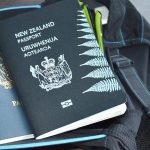Are you dreaming of a magical trip to Turkey, but worried about the potential obstacles in your visa application process? Look no further! We have compiled a list of the top reasons why your Turkey visa application may get rejected, and most importantly, how to avoid them. From minor mistakes that can cost you dearly to crucial missteps that could shatter your travel plans, this blog post will equip you with invaluable tips and insights. Join us as we uncover the secrets to securing your Turkish adventure hassle-free and make sure nothing stands between you and an unforgettable journey through this mesmerizing country! TURKEY VISA APPLICATION
Introduction to Turkey Visa Application:
Turkey is a beautiful country that offers a unique blend of history, culture, and natural beauty. It is a popular tourist destination for people from all around the world, who come to explore its ancient ruins, vibrant markets, and stunning coastline. If you are planning a trip to Turkey, you will need to obtain a visa before your arrival.
A visa is an official document that allows you to enter and stay in a foreign country for a specific period of time. In the case of Turkey, it grants you permission to enter the country and stay for up to 90 days within a 180-day period. Without a valid visa, you will not be allowed entry into Turkey.
Applying for a Turkish visa may seem like a daunting process at first, but with the right information and preparation, it can be relatively straightforward. In this section of our article on top reasons why your Turkey visa application may get rejected, we will provide you with an introduction to the Turkish visa application process.
Types of Turkish Visas:
Before applying for your Turkish visa, it is essential to determine which type of visa best suits your purpose of travel. There are various categories of visas available for different purposes such as tourism, business trips, work permits or study permits. TURKEY VISA REJECTED
Common Reasons for Rejected Visa Applications
There are several common reasons why visa applications for Turkey may be rejected. It is important to be aware of these reasons before submitting your application in order to increase your chances of approval. In this section, we will discuss some of the most common reasons for rejected visa applications and provide tips on how to avoid them.
1. Incomplete or Incorrect Information: One of the main reasons for visa rejection is incomplete or incorrect information provided in the application. This includes missing documents, incorrect personal details, or failure to provide necessary supporting documents such as bank statements or hotel reservations. To avoid this, make sure to carefully read and fill out all sections of the application form accurately and double check all information before submitting.
2. Insufficient Financial Means: Another common reason for visa rejection is insufficient funds to cover the trip expenses. The Turkish government requires applicants to have enough funds to support themselves during their stay in Turkey. If you are unable to prove that you have enough money to cover your expenses, your application may be rejected. Make sure that you have a sufficient amount of money in your bank account and provide supporting documents such as bank statements or proof of employment.
3. Lack of Travel History: Some countries require applicants to have a certain level of travel history before granting a visa. If you have never traveled outside of your home country before, it could raise red flags for the consular officer reviewing your application.
Incomplete or Incorrect Information
Incomplete or incorrect information is one of the most common reasons for a Turkey visa application to get rejected. This can happen due to various reasons such as careless mistakes, lack of attention to detail, or misunderstanding of the requirements. However, regardless of the reason, it can result in significant delays and even rejection of your visa application.
To avoid this issue, it is crucial to ensure that all the information provided in your application is accurate and complete. Here are some specific areas where applicants tend to make mistakes:
1. Personal Information: Your personal information, including your name, date of birth, passport number, and contact details should match exactly with what is mentioned on your passport. Even a small discrepancy can lead to rejection of your application.
2. Purpose of Travel: It is essential to clearly state the purpose of your visit to Turkey in your application form. If you plan on attending an event or conference, provide relevant documents such as invitation letters or conference registration details.
3. Travel Dates: Providing incorrect travel dates can also lead to rejection as it may create suspicion about the authenticity of your travel plans. Make sure that you have confirmed flight tickets and hotel reservations for the exact dates mentioned in your application.
4. Supporting Documents: The Turkish Embassy requires certain supporting documents depending on the purpose and duration of your stay in Turkey. These could include bank statements, employment letters, proof of accommodation, travel insurance, etc. Failing to provide these documents or providing incomplete/incorrect ones can result in a rejection.
Insufficient Financial Resources:
One of the most common reasons for a rejected Turkey visa application is insufficient financial resources. This means that the applicant has not provided enough evidence to prove that they have enough funds to cover their travel expenses during their stay in Turkey.
The Turkish government requires all visa applicants to have sufficient financial resources in order to be granted a visa. This is to ensure that the applicant will not face any financial difficulties during their stay and also prevent them from becoming a burden on the Turkish economy.
Here are some tips on how to avoid having your visa application rejected due to insufficient financial resources:
1. Provide accurate and complete documentation: It is important to provide clear and detailed documentation of your finances when applying for a Turkey visa. This includes bank statements, pay slips, tax returns, property ownership documents, and any other relevant documents that show your financial stability.
2. Show proof of steady income: When reviewing a visa application, the Turkish authorities want to see that the applicant has a stable source of income. If you are employed, make sure to include employment letters or contracts along with recent pay slips. If you are self-employed, provide documents such as business registration certificates and tax returns.
3. Include proof of sponsorship or support: If someone else will be financing your trip, it is important to provide supporting documents such as an invitation letter from your sponsor in Turkey stating that they will cover all expenses related to your trip.
Previous Travel History/Evidence of Ties to Home Country
When applying for a Turkey visa, one of the most important factors that will be considered is your previous travel history and evidence of ties to your home country. This information helps the embassy or consulate determine whether you have a legitimate reason to visit Turkey and if there is a likelihood that you will return to your home country after your trip.
Here are some key points to keep in mind when providing evidence of your ties to your home country:
1. Previous Travel History:
The Turkish government wants to ensure that visitors are genuine tourists and not using their visa as a way to gain entry into the country for other purposes. As such, having a clean record of past travels can greatly increase your chances of getting approved for a visa. If you have traveled frequently in the past, this shows that you have experience with following immigration rules and regulations, making you a low-risk candidate for a visa.
2. Purpose of Your Trip:
Your purpose for visiting Turkey should align with the type of visa you are applying for. For example, if you are applying for a tourist visa but state that you plan on attending business meetings during your stay, this may raise suspicions about the true purpose of your trip. Make sure all aspects of your application – including supporting documents like hotel bookings and itinerary – clearly state the purpose of your trip.


